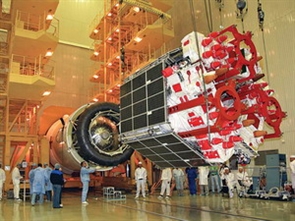Radio Voice of Russia on August 17 quoted the chairman of the Russian National Space Agency Anatoly Perminov, said Russia's GLONASS positioning satellite system, equivalent to the US GPS system, will cover the whole world. Last year.

Satellite system of Russian GLONASS positioning.
(Photo: Internet)
In order for the satellite system to guide the global operation effectively, there must be at least 24 satellites on orbit around the Earth.
Currently, Russia's navigation system consists of 21 GLONASS-type satellites operating in space orbit. Russia hopes this year to complete the process of launching the satellite and by the end of December, there will be 24 satellites operating regularly in orbit.
Russia's GLONASS satellite navigation system has been developed by the Russian armed forces since the 1980s of the 20th century in order to compete with the US Global Positioning System (GPS) and in the future will compete with the System Galileo of Europe.
President of the Russian National Space Agency Perminov also mentioned another important project - the establishment of the Arctica space system that allows monitoring of meteorological conditions and geological exploration of the Arctic region.
According to him, the North Pole is a "test welding" that represents the weather of the whole world. For Russia, this region is particularly important, because the climate process warms first to northern Russia. However, in the Northern Hemisphere, the locality is higher than latitude 60-80, there is no system of space that works regularly, so to study and exploit resources in the Arctic, this system is very necessary.
The Arctica universe system can become an international project, when Canada also operates in this direction and shows interest in the project. In addition, Italy and some Asian countries also advocated cooperation with Russia in this area.
Referring to the International Space Station (ISS), the Chairman of the Russian Space Agency said that ISS could continue to operate in orbit during the next 10 years, and some modules could operate for 20 years.
In the future, ISS can become a launch base for spacecraft flying to other planets, such as Mars.
However, Perminov said it was projects in the distant future. For example, the expedition to the Red planet may hit the road no earlier than 2030-2035. However, for the space industry, 25 years is not a long term.
 Van Allen's belt and evidence that the Apollo 11 mission to the Moon was myth
Van Allen's belt and evidence that the Apollo 11 mission to the Moon was myth The levels of civilization in the universe (Kardashev scale)
The levels of civilization in the universe (Kardashev scale) Today Mars, the sun and the Earth are aligned
Today Mars, the sun and the Earth are aligned The Amazon owner announced a secret plan to build a space base for thousands of people
The Amazon owner announced a secret plan to build a space base for thousands of people Russia creates 50 qubit ion quantum computer
Russia creates 50 qubit ion quantum computer  Why are there so many people of Asian descent living in Russia?
Why are there so many people of Asian descent living in Russia?  Why in this country, buying a can of 'god cow' must also show a citizen's identity?
Why in this country, buying a can of 'god cow' must also show a citizen's identity?  What would the space station be without Russia?
What would the space station be without Russia?  The world's most powerful icebreaker started testing at sea
The world's most powerful icebreaker started testing at sea  The country once had the opportunity to erase Russia from the world map
The country once had the opportunity to erase Russia from the world map 